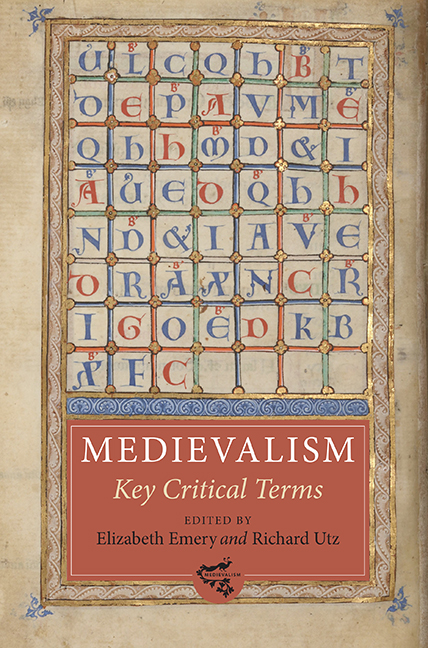Book contents
- Frontmatter
- Dedication
- Contents
- List of Illustrations
- List of Contributors
- Making Medievalism: A Critical Overview
- 1 Archive
- 2 Authenticity
- 3 Authority
- 4 Christianity
- 5 Co-disciplinarity
- 6 Continuity
- 7 Feast
- 8 Genealogy
- 9 Gesture
- 10 Gothic
- 11 Heresy
- 12 Humor
- 13 Lingua
- 14 Love
- 15 Memory
- 16 Middle
- 17 Modernity
- 18 Monument
- 19 Myth
- 20 Play
- 21 Presentism
- 22 Primitive
- 23 Purity
- 24 Reenactment
- 25 Resonance
- 26 Simulacrum
- 27 Spectacle
- 28 Transfer
- 29 Trauma
- 30 Troubadour
- Index
- Medievalism
2 - Authenticity
Published online by Cambridge University Press: 08 October 2022
- Frontmatter
- Dedication
- Contents
- List of Illustrations
- List of Contributors
- Making Medievalism: A Critical Overview
- 1 Archive
- 2 Authenticity
- 3 Authority
- 4 Christianity
- 5 Co-disciplinarity
- 6 Continuity
- 7 Feast
- 8 Genealogy
- 9 Gesture
- 10 Gothic
- 11 Heresy
- 12 Humor
- 13 Lingua
- 14 Love
- 15 Memory
- 16 Middle
- 17 Modernity
- 18 Monument
- 19 Myth
- 20 Play
- 21 Presentism
- 22 Primitive
- 23 Purity
- 24 Reenactment
- 25 Resonance
- 26 Simulacrum
- 27 Spectacle
- 28 Transfer
- 29 Trauma
- 30 Troubadour
- Index
- Medievalism
Summary
WHILE THE WORD authentic is cited in the Oxford English Dictionary (OED) as early as 1340, its first development as a noun, authenticity, does not appear until 1657, although the cluster of meanings is much the same as for the term authentic: 1) “being authoritative, or duly authorized,” legal, worthy of respect; 2) “being in accordance with fact, as being true in substance”; 3) “being what [is professed] in origin or authorship, being genuine,” really proceeding from the reputed source, of undisputed origin; and 4) “being real [or] actual.” The term authentic with its various meanings has great significance for medieval studies and medievalism, as these intertwined fields of scholarship are deeply concerned with the search for authenticity, albeit in a number of different, but overlapping quests. For the purposes of this article, authenticity takes on four intertwined definitions. These are, first, “authenticity as historical accuracy”; second, “the authentic as the original”; third, “the authentic as the authorized version”; and fourth, “authenticity as believability or verisimilitude.”
From its inception as a field of study, medievalism has been identified as different from medieval studies – as it pertains to scholarship on texts, objects, and events created or occurring within the span of time historians have designated as medieval or the Middle Ages. Of course, even the designation Middle Ages is problematic in terms of periodization, and the dates of the said era are often in dispute. Medieval studies is often described as the study of the “authentic” Middle Ages, that is, of authenticated artifacts and texts from the Middle Ages, while medievalism is said to be the study of artifacts and texts from later historical periods that make use of medieval matter. Created at a chronological distance from the historical Middle Ages, works that are described with the label medievalism are therefore seen as “inauthentic” interpretations of a supposedly authentic medieval world. Much scholarship on medievalism analyzes the ways such texts (in the broadest possible sense) transform allegedly authentic originals by infusing them with the obsessions, style, and tastes of their own eras.
Medievalism, therefore, is in one sense the study of necessarily inauthentic “medieval” matter, filtered through a variety of eras, cultures, zeitgeists.
- Type
- Chapter
- Information
- Medievalism: Key Critical Terms , pp. 19 - 26Publisher: Boydell & BrewerPrint publication year: 2014



